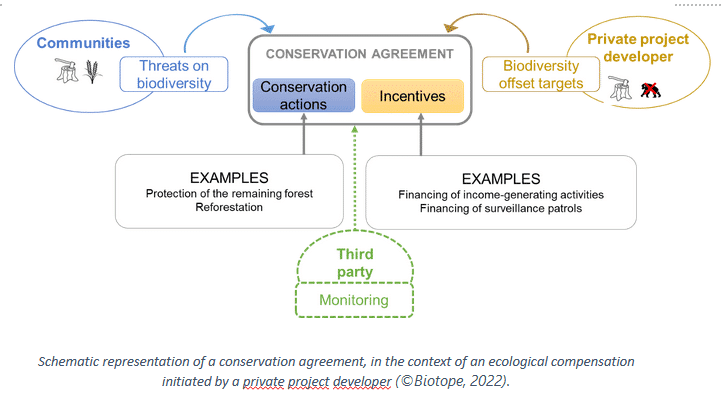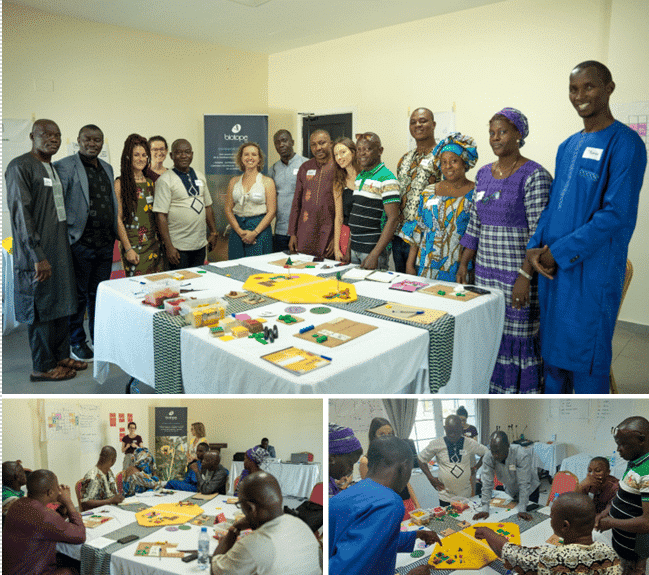COHAB – Identification of solutions for a cohabitation between chimpanzees and local communities in Fouta-Djalon (Guinea) – 2019 – 2022
Communication note on the institutional workshop held in Conakry on November 2&4, 2022
ote de communication sur l’atelier institutionnel réalisé à Conakry les 2&4 novembre 2022
The COHAB project is funded by the ARCUS Foundation and implemented by Biotope, in partnership with Guinée Ecologie, Jane Goodall Institute (Spain) and LEAF Inspiring Change. The objective of this 3-year project is to identify solutions to improve cohabitation between chimpanzees and local communities in the Fouta-Djalon, in Guinea.
Since 2019, Biotope and its partners have been working closely with three pilot sites in Fouta Djalon (Sabé, Saala, and Kéwé) to develop a methodology aiming to facilitate the establishment of community conservation agreements (outside of protected areas) that are positive to chimpanzee conservation and local communities’ economic development. The development of these agreements was based on two key steps:
- A series of “Strategic Games” and participatory mapping workshops in the three pilot project sites to raise community awareness of the impacts of their activities on biodiversity, but also to build solutions for cohabitation with chimpanzees. The “COHAB” game was specifically created for this project and is the result of a co-construction work with our partner LEAF Inspiring Change, expert in the development of “Strategic Games” and in working with local communities. The game is adapted to the agro-ecological and socio-economic context of Fouta Djalon and models the interactions between agriculture, forest and chimpanzees.
- A series of workshops for the co-construction of conservation agreements with dedicated working groups within each community. These workshops allowed us to develop conservation agreement models based on the various solutions that emerged during the game, but also to define their implementation modalities and prioritize actions for their realization on the ground.
In order to present the results and tools developed by the COHAB project, Biotope and LEAF Inspiring Change organized a “Strategic Games” workshop on November 2 and 4, 2022 for Guinean institutional actors. Representatives from the Ministry of Environment and Sustainable Development (MEED), the National Directorate of Forests and Wildlife (DNFF), the Guinean Environmental Assessment Agency (AGEE), the Guinean Office of National Parks and Wildlife Reserves (OGPNRF), the Ministry of Energy and Hydraulics, the Ministry of Agriculture and Animal Husbandry, the Chamber of Mines, as well as the Guinean IUCN Focal Point were present.
The workshop was held over two half days. The first day of the “discovery” workshop was dedicated to the presentation of the COHAB project and its main results, followed by an introduction to the strategic game to allow participants to discover the rules and become familiar with this innovative approach to consultation. The second day of the “exploration” workshop allowed participants to concretely apply the terms of a conservation agreement through the game. Playing the role of communities, participants were able to define (1) the conservation measures they wished to implement on the land, (2) negotiate with an external project leader by defining the income-generating activities they wished to develop, and (3) see the interest, but also the risks, linked to the implementation of a conservation agreement on the ground. The session ended with a discussion on the value of using the “strategic game” as a facilitation tool for communities and decentralized authorities, as well as on the main recommendations for promoting community conservation agreements as ecological compensation mechanisms for the impacts of development projects in Guinea.

The objectives of the COHAB project are in synergy with those of the COMBO+ project “Conservation, Minimization and Biodiversity Offsets”, implemented in Guinea by Biotope and Guinea Ecologie, in collaboration with the Ministry of the Environment and Sustainable Development (MEDD), and financed by AFD and FFEM over the next 4 years. The COMBO+ project aims to reconcile economic development and the consideration of biodiversity issues, through the integration of strategies and policies to manage environmental impacts. Thus, the deployment of conservation agreements supported by the COHAB project proposes an innovative solution of ecological compensation to project developers, within the framework of the application of mitigation hierarchy (Avoid – Reduce – Restore – Compensate).
